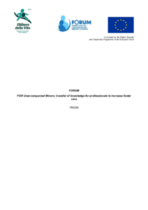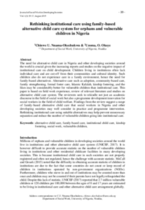The Provision of Foster Care for Unaccompanied Migrant Children: Some considerations
This article is written as part of the FORUM project (FOR Unaccompanied Minors: transfer of knowledge for professionals to increase foster care), an EU funded project which sought to enhance the capacity of professionals to provide quality foster care for unaccompanied migrant children, primarily through the transfer of knowledge. The article aims to contribute to this transfer of knowledge by bringing together literature which is of relevance to professionals developing or enhancing foster care services for unaccompanied migrant children.



